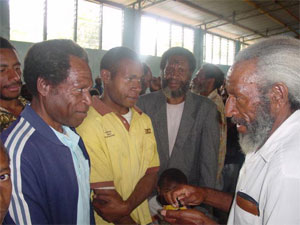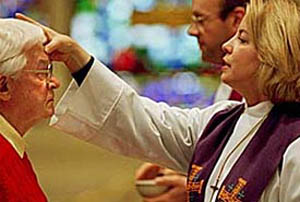A Day of Ashes and Rituals of Renewal
A guest essay by novelist Ron Hansen. Ron's many books include Exiles (2008) and A Wild Surge of Guilty Passion (2011). Among his many honors are a Guggenheim Foundation grant, an Award in Literature from the American Academy and National Institute of Arts and Letters, two grants from the National Endowment for the Arts, and a three-year fellowship from the Lyndhurst Foundation. He is currently the Gerard Manley Hopkins, S.J. Professor in the Arts and Humanities at Santa Clara University, where he earned an M.A. in Spirituality in 1995.
For Ash Wednesday February 22 and Sunday February 26, 2012
The First Sunday in Lent
Lectionary Readings (Revised Common Lectionary, Year B)
Joel 2:1–2, 12–17 or Isaiah 58:1–12
Psalm 51:1–17
2 Corinthians 5:20–6:10
Matthew 6:1–6, 16–21
I have always thought of Ash Wednesday as the Christian version of the Jewish holiday Yom Kippur, or “Day of Atonement.” Even some of my Jewish friends who do not regularly go to synagogue services, or generally ignore their religious instructions and customs, often feel the need for greater orthodoxy on Yom Kippur. They'll attend the first evening service for the singing of the liturgical prayer called the Kol Nidre, or “All vows,” fast the full day, and observe the Talmudic restrictions on hygiene and dress. The call of the holiday is for a confession of offenses against the Holy One, along with solemn petitions for forgiveness in the hope of being inscribed in the Book of Life for the next year.
 |
Receiving ashes in Papua New Guinea. |
So it is with Ash Wednesday. Called originally dies cinerum, or “day of ashes,” Ash Wednesday has inaugurated the season of Lent since at least the 8th century when it was a confessional penance for notorious sinners to humiliate themselves, like Job or Daniel, with sackcloth and ash. That prescription gradually became a form of piety for all Christians.
While probably most famous as a Roman Catholic ritual, Anglicans, Episcopalians, Lutherans, Methodists, Presbyterians, and some Baptists also enact, with variations, the signing of the cross on the forehead with the charred remains of last year’s Palm Sunday fronds, as a minister intones the quotation from the Book of Genesis: “Remember that thou art dust, and unto dust thou shalt return.” And though no denomination obligates its members to attend the service, yet churches are often more crowded on that holy day than on the Sabbath. Of all Christianity’s public ceremonies, Ash Wednesday is perhaps the most introspective at its core, and the root of that is in the first reading from the Book of Joel.
 |
Ash Wednesday in Australia. |
The first chapter of Joel is a lamentation calling its hearers’ attention to a presumably well-known infestation of locusts that caused devastation to the fields and starvation to Judah’s inhabitants. The prophet’s oracle in our reading from the second chapter is a plaintive call for fasting, repentance, and prayer to the LORD “for gracious and merciful is he, slow to anger, rich in kindness, and relenting in punishment.” But crucial to full reconciliation, Joel insists, is not the theater of cultic ritual but interiority and self-examination. As he puts it, “Rend your hearts, not your garments.”
Reconciliation is also central in Saint Paul’s letter to his converts in Corinth. In the Old Testament reading, the LORD’s vengeance toward his land and people was adjourned in response to their entreaties, but here Paul makes a fundamental theological correction in noting that the hostility is fully ours and it is humanity that needs to “relent” from sin and harmonize with God. And here he also notes that we who have been justified once and for all by Christ’s sacrifice on the cross still have to strive continually to become Christ’s righteousness for others or we will have received “the grace of God in vain.”
 |
Receiving ashes in the United States. |
Three principal acts of piety are highlighted in the gospel reading from Matthew: almsgiving, prayer, and fasting. Written at a time when the Matthean community was garnering opposition from some Jewish factions, this extension of the Sermon on the Mount offers a hint of Jesus’s humor that is often lost in translation as he caricatures the ostentatious displays of those who follow the letter of Joel’s oracle but persist in rending their garments, not their hearts.
But it would be a mistake to think of Lent solely as forty days of hunger and denial. In one Eucharistic prayer in the Roman Missal we find these words addressed to God: “Each year you give us this joyful season when we prepare to celebrate the paschal mystery with mind and heart renewed.” Renewal and growth are what Jesus sought for his disciples, and are fundamental to the teaching of all our readings for Ash Wednesday, and the Day of Atonement as well.
Image credits: (1) SocietyofOurLady.net; (2) Life's Rich Pageant blog; and (3) Traditio; the Traditional Roman Catholic Network.





